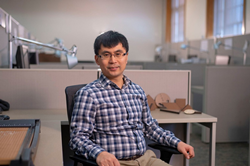
Shichao Liu
“I realized that if the students are stressed, how could they pay attention to what I was talking about?”– Shichao Liu, Assistant Professor, Civil and Environmental Engineering
WORCESTER, Mass. (PRWEB)
May 13, 2020
Worcester Polytechnic Institute (WPI) researchers with expertise in fields ranging from psychology to architectural engineering will use a $199,999 grant from the National Science Foundation (NSF) to study how the novel coronavirus global pandemic is affecting stress in college students and their ability to learn in remote settings.
The research is notable because it will be done during a real pandemic and gather data about the real strains felt by students, said Shichao Liu, assistant professor of civil and environmental engineering, who is the principal investigator of the one-year project.
“We have to do this research now, because the conditions are ephemeral, and our students are stressed during this critical time,” Liu said. “We can’t do this research at another time or simulate a pandemic in a laboratory.”
The NSF awarded the grant through its Rapid Response Research (RAPID) process, which focuses on proposed projects that need quick access to data and resources, and research that responds to disasters and unanticipated events.
Co-PIs on the grant are Soroush Farzin Moghadam, assistant teaching professor of architectural engineering; Angela Rodriguez, assistant professor of psychology and neuroscience; Steven Van Dessel, associate professor of architectural engineering; and Jacob Whitehill, assistant professor of computer science and of learning sciences and technologies. Two PhD candidates and two WPI undergraduates will be part of the research team, which will work remotely and via virtual meetings.
“This project will provide insights into how college students are coping with a purely distance-learning format, without immediate contact with or support from their peers or professors,” Whitehill said. “It will shed light into how students’ emotional trajectories and academic outcomes are affected by the short- and long-term effects of the novel coronavirus.”
Liu conceived of the research as WPI, like other universities across the country, switched to remote operations earlier this year. He, Van Dessel, and Whitehill had recently launched NSF-funded research on how classroom physical environments impact undergraduate learning. Then, as he began teaching remotely while home with his wife and two small children, Liu felt stressed. His students also told him about the emotions they were feeling while quarantined at home, worrying about sick relatives, and missing their college friends.
“I realized that if the students are stressed, how could they pay attention to what I was talking about? How could they finish their homework on time?” Liu said. “Teachers may feel stressed outside the traditional classroom, but students are more vulnerable than instructors. One possible stressor on students’ learning comes from a poor physical environment while learning at home. Factors such as elevated noise, insufficient lighting, little access to outdoor sunlight due to social distancing, or even smoke from cooking activities may contribute to stress in college students, distraction, and impaired learning performance.”
The researchers plan to recruit WPI undergraduates to voluntarily participate in the study during the university’s three remaining academic terms this calendar year. Participants will fill out questionnaires and keep diaries of their activities. To measure student engagement, the researchers will use computer vision algorithms to analyze students’ facial expressions during remote classes. In addition, one group of students will wear wristband computing devices to record and track their heart rates and other physiological signals.
“We all want to see our lives return to something approximating ‘normal,’” said Rodriguez. “This is especially strongly felt by college students across the nation who have had to shift their entire learning experience to a virtual platform with almost no preparation. But in order to get back to a traditional learning experience and achieve ideal learning outcomes, we have to understand how the pandemic affected these things in the first place. We must understand the magnitude of the impact so that we can track the recovery toward normal.”
The project’s researchers possess expertise in architectural engineering, psychology, computer science, and learning sciences, reflecting WPI’s strategy to create interdisciplinary teams to address COVID-19 research challenges, said Provost Winston Soboyejo.
“I am delighted to learn about the success of the RAPID grant application by Shichao Liu, Soroush Farzin Moghadam, Angela Rodriguez, Steven Van Dessel, and Jacob Whitehill,” Soboyejo said. “This is a great example of timely interdisciplinary collaboration that will provide much needed insights into how our students adapt and learn in the era of the COVID-19 crisis.”
About Worcester Polytechnic Institute
WPI, the global leader in project-based learning, is a distinctive, top-tier technological university founded in 1865 on the principle that students learn most effectively by applying the theory learned in the classroom to the practice of solving real-world problems. Recognized by the National Academy of Engineering with the 2016 Bernard M. Gordon Prize for Innovation in Engineering and Technology Education, WPI’s pioneering project-based curriculum engages undergraduates in solving important scientific, technological, and societal problems throughout their education and at more than 50 project centers around the world. WPI offers more than 50 bachelor’s, master’s, and doctoral degree programs across 14 academic departments in science, engineering, technology, business, the social sciences, and the humanities and arts. Its faculty and students pursue groundbreaking research to meet ongoing challenges in health and biotechnology; robotics and the internet of things; advanced materials and manufacturing; cyber, data, and security systems; learning science; and more. http://www.wpi.edu
Contact:
Colleen Bamford Wamback
Associate Director of Public Relations
Worcester Polytechnic Institute
508-688-4858 (cell)
cbwamback@wpi.edu









